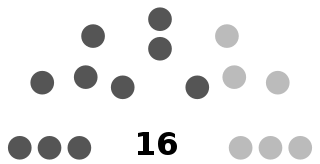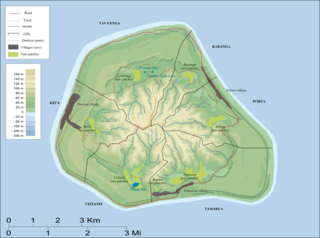Related Research Articles

The Parliament of Tuvalu is the unicameral national legislature of Tuvalu. The place at which the parliament sits is called the Vaiaku maneapa. The maneapa on each island is an open meeting place where the chiefs and elders deliberate and make decisions.

The Parliament of the Cook Islands is the legislature of the Cook Islands. Originally established under New Zealand’s United Nations mandate it became the national legislature on independence in 1965.

Akaoa is a Cook Islands electoral division returning one member to the Cook Islands Parliament.

Arutanga–Reureu–Nikaupara is a Cook Islands electoral division returning one member to the Cook Islands Parliament. Its current representative is Tereapii Maki-Kavana, who has held the seat since 2018.

Vaipae–Tautu is a Cook Islands electoral division returning one member to the Cook Islands Parliament. Its current representative is Kitai Teinakore, who has held the seat since 2018.

Teenui–Mapumai is a Cook Islands electoral division returning one member to the Cook Islands Parliament.

Oneroa is a Cook Islands electoral division returning one member to the Cook Islands Parliament. Its current representative is Wesley Kareroa, who has held the seat since 2014.

Ivirua is a Cook Islands electoral division returning one member to the Cook Islands Parliament. Its current representative is Agnes Armstrong, who has held the seat since she won it in a by-election in 2019.

Tamarua is a Cook Islands electoral division, with one representative in the Cook Islands Parliament. Its current representative is Tetangi Matapo, who has held the seat since winning a by-election in 2013.

The Constitution of Samoa is a written constitution which is the supreme law in Samoa. It establishes Samoa as a parliamentary republic with a Westminster system and responsible government. It outlines the structure and powers of the Samoan government's three parts: the executive, legislature, and judiciary.

Avatiu–Ruatonga–Palmerston or RAPPA is a Cook Islands electoral division returning one member to the Cook Islands Parliament.

Matavera is a Cook Islands electoral division returning one member to the Cook Islands Parliament.

Murienua is a Cook Islands electoral division returning one member to the Cook Islands Parliament.

Ngatangiia is a Cook Islands electoral division returning one member to the Cook Islands Parliament.

Nikao–Panama is a Cook Islands electoral division returning one member to the Cook Islands Parliament.

Ruaau is a Cook Islands electoral division returning one member to the Cook Islands Parliament.

Titikaveka is a Cook Islands electoral division returning one member to the Cook Islands Parliament.

Takuvaine–Tutakimoa is a Cook Islands electoral division returning one member to the Cook Islands Parliament.

Tupapa–Maraerenga is a Cook Islands electoral division returning one member to the Cook Islands Parliament.

The judiciary of the Cook Islands is a system of courts that interprets and applies the laws of the Cook Islands. The judiciary has three levels: the Judicial Committee of the Privy Council serves as a final court of appeal. The Cook Islands Court of Appeal hears appeals from the High Court. The High Court of the Cook Islands deals with criminal and civil cases, as well as land cases under customary law. Minor crimes are heard in the High Court by Justices of the Peace.
References
- ↑ "Constitution Amendment (No 9) Act 1980-81". PACLII. Retrieved 14 July 2020.
- 1 2 "Overseas electorate for Cook Islands". Pacific Islands Monthly. 52 (1). 1 January 1981. p. 30. Retrieved 26 July 2020– via National Library of Australia.
- ↑ "The Cook Islands: Seat for Overseas Voters Abolished". ACE Project. Retrieved 26 July 2020.
It was the result of a move by the Democratic Party (DP) then in power to restrict the future influence of those whom they regarded as mostly loyal to the Cook Islands Party (CIP)
- ↑ "Henry the Second's first government". Pacific Islands Monthly. 54 (6). 1 June 1983. pp. 12–14. Retrieved 26 July 2020– via National Library of Australia.
- ↑ Barbara Dreaver (16 February 1994). "Big issues cooking up for polling day". The Canberra Times. p. 9. Retrieved 26 July 2020– via National Library of Australia.
- ↑ "Cook Islanders vote for less or more of the same". New Zealand Herald. 7 September 2004. Retrieved 26 July 2020.
- ↑ "FUTURE OF COOK ISLANDS OVERSEAS CONSTITUENCY BEING EXAMINED". Pacific Islands Report. 24 September 2002. Retrieved 26 July 2020.
- ↑ "Constitution Amendment (No 26) Act 2003". PACLII. Retrieved 26 July 2020.
- ↑ "Cook Islands Parliament drops "Overseas Seat"". RNZ. 17 April 2003. Retrieved 26 July 2020.
- ↑ Constitution Amendment (No. 26) Act 2003, section 6.